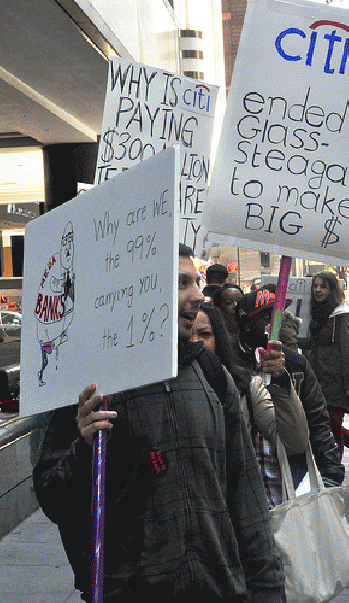For 66 years the Glass-Steagall act reduced the risks in the banking system. Eight years after the act was repealed, the banking system blew up threatening the international economy. US taxpayers were forced to come up with $750 billion dollars, a sum much larger than the Pentagon's budget, in order to bail out the banks. This huge sum was insufficient to do the job. The Federal Reserve had to step in and expand its balance sheet by $4 trillion in order to protect the solvency of banks declared "too big to fail."
The enormous increase in the supply of dollars known as Quantitative Easing inflated financial asset prices instead of the consumer price index. This rise in bond and stock prices is a major cause of the worsening income and wealth distribution in the United States. The economic polarization has undercut the image and reality of the US as a land of opportunity and has introduced political and economic instability into the life of the country.
These are huge costs and for the benefit only of the rich who were already rich.
So, what we can say about the repeal of Glass-Steagall is that it turned a somewhat egalitarian democracy with a large middle class into the One Percent vs. the 99 percent. The repeal resulted in the destruction of the image of the United States as an open prosperous society. The electorate is very much aware of the decline in their economic situation, and this awareness expressed itself in the last presidential election.
Americans know that the nonsense from the US Bureau of Labor Statistics about a 4.3% unemployment rate and an abundance of new jobs is fake news. The BLS gets the low rate of unemployment by not counting the millions of discouraged workers who cannot find employment. If you haven't looked for a job in the last 4 weeks, you are not considered unemployed. The birth/death model, a purely theoretical construct, accounts for a large percentage of the non-existent new jobs. The jobs are there by assumption. The jobs are not really there. Moreover, the replacement of full time jobs with part time jobs proceeds. Pension and health care benefits that once were a substantial part of the pay package are being terminated.
It makes perfect sense to separate commercial from investment banking. The taxpayer insured deposits of commercial banking should not serve as backing for investment banking's creation of risky financial instruments, such as subprime and other derivatives. The US government understood that in 1933, but no longer did in 1999. This deterioration in government competence has cost America dearly.
By merging commercial banking with investment banking, the repeal of Glass-Steagall greatly increased the capability of the banking system to create risky financial instruments for which taxpayer backing was available. So, we have the extraordinary situation that the repeal of Glass-Steagall forced the 99 percent to bail out the One Percent.
The repeal of Glass-Steagall has turned the United States into an unstable economic, political, and social system. We have a situation in which millions of Americans who have lost full time employment with benefits to jobs offshoring, whose lower income employment in part time and contract employment leaves them no discretionary income after payment of interest and fees to the financial system (insurance on home and car, health insurance, credit card interest, car payment interest, student loan interest, home mortgage interest, bank charges for insufficient minimum balance, etc.), are on the hook for bailing out financial institutions that make foolish and risky investments.
This is not politically viable unless Congress and the President are going to resign and turn over the governance of America to Wall Street and the Big Banks. A growing crescendo of voices are saying that this has already happened.
So, where is there any democracy when the One Percent can cover their losses at the expense of the 99 Percent, which is what the repeal of Glass-Steagall guarantees?
Not only must Glass-Steagall be restored, but also the large banks must be reduced in size. That any corporation is too big to fail is a contradiction of the justification of capitalism. Capitalism's justification is that those corporations that misuse resources and make losses go out of business, thus releasing the misused resources to those who can use them profitably.
Capitalism is supposed to benefit society, not be dependent on society to bail it out.
I was present when George Champion, former CEO and Chairman of Chase Manhattan Bank testified before the Senate Banking Committee against national branch banking. Champion said that it would result in the banks becoming too large and that the branches would suck savings out of local communities for investment in traded financial assets. Consequently, local communities would be faced with a dearth of loanable funds, and local businesses would die or not be born from lack of loanable funds.
I covered the story for Business Week. But despite the facts as laid out by the preeminent banker of our time, the palms had been greased, and the folly proceeded.
As Assistant Secretary of the US Treasury in the Reagan Administration, I opposed all financial deregulation. Financial deregulation does nothing but open the gates to fraud and sharp dealing. It allows one institution, even one individual, to make a fortune by wrecking the lives of millions.
(Note: You can view every article as one long page if you sign up as an Advocate Member, or higher).






